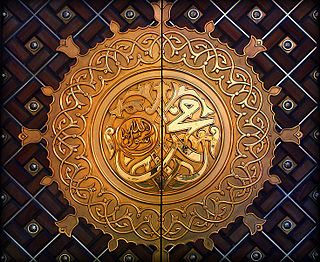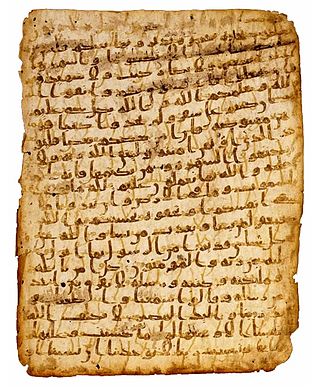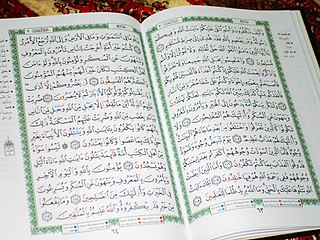Related Research Articles

Muhammad was an Arab religious, social, and political leader and the founder of Islam. According to Islamic doctrine, he was a prophet divinely inspired to preach and confirm the monotheistic teachings of Adam, Abraham, Moses, Jesus, and other prophets. He is believed to be the Seal of the Prophets within Islam. Muhammad united Arabia into a single Muslim polity, with the Quran as well as his teachings and practices forming the basis of Islamic religious belief.
In Islam, sunnah, also spelled sunna, are the traditions and practices of the Islamic prophet Muhammad that constitute a model for Muslims to follow. The sunnah is what all the Muslims of Muhammad's time evidently saw and followed and passed on to the next generations. According to classical Islamic theories, the sunnah are documented by hadith, and along with the Quran, are the divine revelation (Wahy) delivered through Muhammad that make up the primary sources of Islamic law and belief/theology. Differing from Sunni classical Islamic theories are those of Shia Muslims, who hold that the Twelve Imams interpret the sunnah, and Sufi who hold that Muhammad transmitted the values of sunnah "through a series of Sufi teachers."

The Quran, also romanized Qur'an or Koran, is the central religious text of Islam, believed by Muslims to be a revelation from God. It is organized in 114 chapters, which consist of verses. In addition to its religious significance, it is widely regarded as the finest work in Arabic literature, and has significantly influenced the Arabic language.
Saleh, also spelled Salih, is a prophet mentioned in the Quran who prophesied to the tribe of Thamud in ancient Arabia, before the lifetime of Prophet Muhammad. The story of Salih is linked to the story of the She-Camel of God, which was the gift given by God to the people of Thamud when they desired a miracle to confirm that Salih was truly a prophet.

In Islam, Mūsā ibn ʿImrān is an important prophet and messenger of God and is the most frequently mentioned individual in the Quran, with his name being mentioned 136 times and his life being narrated and recounted more than that of any other prophet. He is one of the most important prophets and messengers of Islam.
Tafsir refers to exegesis, usually of the Quran. An author of a tafsir is a mufassir. A Quranic tafsir attempts to provide elucidation, explanation, interpretation, context or commentary for clear understanding and conviction of God's will.
In Islam, Jahannam is the place of punishment for unbelievers and other evildoers in the afterlife, or hell. This notion is an "integral part of Islamic theology", and has "occupied an important place in the Muslim belief". It is often called by the proper name Jahannam. Simultaneously, jahannam is a term specifically for the upper most layer of hell.

Al-Khidr is a figure described but not mentioned by name in the Quran as a righteous servant of God possessing great wisdom or mystic knowledge. In various Islamic and non-Islamic traditions, Khidr is described as an angel, prophet, or wali, who guards the sea, teaches secret knowledge and aids those in distress. He prominently figures as patron of the Islamic saint ibn Arabi. The figure of al-Khidr has been syncretized over time with various other figures including Dūraoša and Sorūsh in Iran, Sargis the General and Saint George in Asia Minor and the Levant, Samael in Judaism, Elijah among the Druze, John the Baptist in Armenia, and Jhulelal in Sindh and Punjab in South Asia.
Criticism of Islam is the act of questioning or challenging the beliefs, practices, and doctrines of Islam. Criticism of Islam can take many forms, including academic critiques, political criticism, and personal opinions.
History of the Quran is the timeline and origin of the written compilations or manuscripts of the holy book of Islam, based on historical findings. It spans several centuries, and forms an important major part of the early history of Islam.
Mafatih al-Ghayb, usually known as al-Tafsir al-Kabir, is a classical Islamic tafsir book, written by the twelfth-century Islamic theologian and philosopher Fakhruddin Razi (d.1210). The book is an exegesis and commentary on the Qur'an. At 32 volumes, it is even larger than the 28-volume Tafsir al-Tabari. It is not unusual for modern works to use it as a reference.
One of [his] major concerns was the self-sufficiency of the intellect. [...] [He] believed [that] proofs based on tradition (hadith) could never lead to certainty (yaqin) but only to presumption (zann), a key distinction in Islamic thought. [...] [However] his acknowledgment of the primacy of the Qur'an grew with his years. [...] [Al-Razi's rationalism] undoubtedly holds an important place in the debate in the Islamic tradition on the harmonization of reason and revelation. In his later years, he also showed interest in mysticism, although this never formed a significant part of his thought.

Muḥammad bin ʿAbd Allāh bin ʿAbd al-Muṭṭalib bin Hāshim is believed to be the seal of the messengers and prophets of God in all the main branches of Islam. Muslims believe that the Quran, the central religious text of Islam, was revealed to Muhammad by God, and that Muhammad was sent to restore Islam, which they believe did not originate with Muhammad but is the true unaltered original monotheistic faith of Adam, Abraham, Moses, Jesus, and other prophets. The religious, social, and political tenets that Muhammad established with the Quran became the foundation of Islam and the Muslim world.
Muhammad Karam Shah al-Azhari was an Islamic scholar of Hanafi jurisprudence, Sufi, and Muslim leader. He is known for his magnum opus, Tafsir Zia ul Quran fi Tafsir ul Quran, meaning “The light of the Quran in the Exegesis of the Quran." It is commonly referred to as Diya ul Quran or Zia ul Quran. He also authored Zia un Nabi, or “Diya al-Nabi," Life of Prophet Muhammad, a detailed biography of Muhammad in seven volumes.

Islam is an Abrahamic monotheistic religion centered on the Quran and the teachings of Muhammad. Adherents of Islam, called Muslims, number approximately 1.9 billion globally and are the world's second-largest religious population after Christians.
Criticism of the Quran is an interdisciplinary field of study concerning the factual accuracy of the claims and the moral tenability of the commands made in the Quran, the holy book of Islam. The Quran is viewed to be the scriptural foundation of Islam and is believed by Muslims to have been sent down by God (Allah) and revealed to Muhammad by the archangel Jabreel, also spelt Jibraeel (Gabriel). It has been subject to criticism both in the sense of being studied by mostly secular Western scholars and in being found fault with.

Islamic holy books are certain religious scriptures that are viewed by Muslims as having valid divine significance, in that they were authored by God (Allah) through a variety of prophets and messengers, including those who predate the Quran. Among the group of religious texts considered to be valid revelations, the three that are mentioned by name in the Quran are the Tawrat, received by prophets and messengers amongst the Children of Israel; the Zabur (Psalms), received by David; and the Gospel, received by Jesus. Additionally, the Quran mentions God's revealing of the Scrolls of Abraham and the Scrolls of Moses.
Prophets in Islam are individuals in Islam who are believed to spread God's message on Earth and to serve as models of ideal human behaviour. Some prophets are categorized as messengers, those who transmit divine revelation, most of them through the interaction of an angel. Muslims believe that many prophets existed, including many not mentioned in the Quran. The Quran states: "And for every community there is a messenger." Belief in the Islamic prophets is one of the six articles of the Islamic faith.
According to Islamic tradition, the Quran was revealed to the Islamic prophet Muhammad by the angel Gabriel (Jibril) in sevenahruf, translated variously as "editions", "styles", "ways", "forms" and "modes". Although Muslim scholars differ on their exact nature, it is thought they constituted a degree of acceptable variation in the Quranic text. The standardisation of the Quranic rasmc. 650 CE and destruction of the mushafs by Rashidun caliph Uthman the extent to which the Uthmanic codex contains the seven ahruf has been a subject of debate. The ahruf are distinct from the ten qira'at, which are other variant readings of the Quran that were canonized later on and are still in use.

Historical reliability of the Quran concerns the question of the historicity of the described or claimed events in the Quran.

In Islam, "the promise and threat" of Judgment Day, when "all bodies will be resurrected" from the dead, and "all persons" are "called to account" for their deeds and their faith during their life on earth. It has been called "the dominant message" of the holy book of Islam, the Quran, and resurrection and judgement the two themes "central to the understanding of Islamic eschatology". Judgement Day is considered a fundamental tenet of faith by all Muslims, and one of the six articles of Islamic faith.
References
- ↑ Melville, Charles (1997). "John Cooper (1947-1998)". Iranian Studies. 30 (3/4): 413–415. doi:10.1080/00210869708701891. ISSN 0021-0862. JSTOR 4311108.
- ↑ "Obituary: John Cooper". The Independent. 24 January 1998.